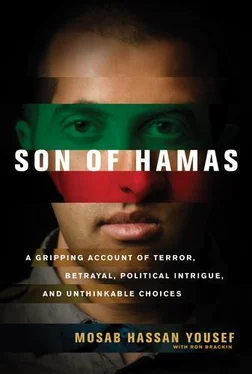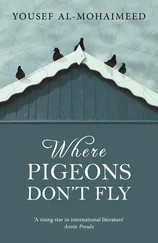Mosab Hassan Yousef
with Ron Brackin
SON OF HAMAS

To my beloved father and my wounded family.
To the victims of the Palestinian-Israeli conflict.To every human life my Lord has saved.
My family, I am very proud of you; only my God can understand what you have been through. I realize that what I have done has caused another deep wound that might not heal in this life and that you may have to live with its shame forever.
I could have been a hero and made my people proud of me. I knew what kind of hero they were looking for: a fighter who dedicated his life and family to the cause of a nation. Even if I was killed, they would have told my story for generations to come and been proud of me forever, but in reality, I would not have been much of a hero.
Instead, I became a traitor in the eyes of my people. Although I once brought pride to you, I now bring you only shame. Although I was once the royal prince, I am now a stranger in a foreign country fighting against the enemy of loneliness and darkness.
I know you see me as a traitor; please understand it was not you I chose to betray, but your understanding of what it means to be a hero. When Middle Eastern nations—Jews and Arabs alike—start to understand some of what I understand, only then will there be peace. And if my Lord was rejected for saving the world from the punishment of hell, I don’t mind being a reject!
I don’t know what the future holds, but I do know that I am not afraid. And now I want to give you something that has helped me to survive so far: all the guilt and shame I have carried for all these years is a small price to pay if it saves even one innocent human life.
How many people appreciate what I have done? Not so many. But that’s okay. I believed in what I did and I still believe, which is my only fuel for this long journey. Every drop of innocent blood that has been saved gives me hope to carry on to the last day.
I paid, you paid, and yet the bills of war and peace continue to come. God be with us all and give us what we need to carry this heavy weight.
With love,
Your son
Time is sequential—a thread spanning the distance between birth and death.
Events, however, are more like a Persian carpet—thousands of richly colored threads woven into intricate patterns and images. Any attempt to place events into purely chronological order would be like pulling the threads loose and laying them end to end. It might be simpler, but you would lose the design.
The events in this book are my best recollections, sorted out from the maelstrom of my life in the occupied territories of Israel and woven together as they occurred—consecutively and concurrently.
To provide you with reference points and to sort out the Arabic names and terms, I have included a brief time line in the appendices, along with a glossary and a list of players.
For security reasons, I have intentionally omitted much of the detail from the accounts of sensitive operations conducted by the Israel Security Agency, the Shin Bet. The information revealed in this book in no way jeopardizes the ongoing global war on terrorism in which Israel plays a leading role.
Finally, Son of Hamas, like the Middle East, is a continuing story. So I invite you to keep in touch by visiting my blog at http://www.sonofhamas.com, where I share my insights on breaking regional developments. I also post updates on what the Lord is doing with the book and in my family and where he is leading me today.
—MHY
Peace in the Middle East has been the holy grail of diplomats, prime ministers, and presidents for more than five decades. Every new face on the world stage thinks he or she is going to be the one to resolve the Arab-Israeli conflict. And each one fails just as miserably and completely as those who have come before.
The fact is, few Westerners can come close to understanding the complexities of the Middle East and its people. But I do—by virtue of a most unique perspective. You see, I am a son of that region and of that conflict. I am a child of Islam and the son of an accused terrorist. I am also a follower of Jesus.
Before the age of twenty-one, I saw things no one should ever see: abject poverty, abuse of power, torture, and death. I witnessed the behind-the-scenes dealings of top Middle Eastern leaders who make headlines around the world. I was trusted at the highest levels of Hamas, and I participated in the so-called Intifada. I was held captive in the bowels of Israel’s most feared prison facility. And as you will see, I made choices that have made me a traitor in the eyes of people I love.
My unlikely journey has taken me through dark places and given me access to extraordinary secrets. On the pages of this book I finally reveal some of those long-hidden secrets, exposing events and processes that to this point have been known only by a handful of shadowy individuals.
The uncovering of these truths will likely send shock waves through parts of the Middle East, but I hope it will also bring comfort and closure to the families of many victims of this unending conflict.
As I move among Americans today, I find that many of them have a lot of questions about the Arab-Israeli conflict, but very few answers and even less good information. I hear questions like:
• “Why can’t people just get along in the Middle East?”
• “Who is in the right—the Israelis or the Palestinians?”
• “To whom does the land really belong? Why don’t Palestinians just move to other Arab countries?”
• “Why doesn’t Israel give back the land and property it won in the 1967 Six-Day War?”
• “Why are so many Palestinians still living in refugee camps? Why don’t they have their own state?”
• “Why do Palestinians hate Israel so much?”
• “How can Israel protect itself from suicide bombers and frequent rocket attacks?”
These are good questions, all of them. But none of them touch on the real issue, the root problem. The current conflict stretches all the way back to the animosity between Sarah and Hagar described in the first book of the Bible. To understand the political and cultural realities, however, you really don’t have to look much further than the aftermath of World War I.
When the war ended, the Palestinian territories, national home of the Palestinian people for centuries, fell under the mandate of Great Britain. And the British government had an unusual notion for the area, which it stated in the Balfour Declaration of 1917: “His Majesty’s Government view with favour the establishment in Palestine of a national home for the Jewish people.”
Encouraged by the British government, hundreds of thousands of Jewish immigrants, mostly from Eastern Europe, flooded into the Palestinian territories. Clashes between Arabs and Jews were inevitable.
Israel became a state in 1948. However, the Palestinian territories remained just that—nonsovereign territories. Without a constitution to maintain some semblance of order, religious law becomes the highest authority. And when everyone is free to interpret and enforce the law as he sees fit, chaos ensues. To the outside world, the Middle Eastern conflict is simply a tug-of-war over a small stretch of land. But the real problem is that no one yet has understood the real problem. And as a result, negotiators from Camp David to Oslo confidently continue to splint the arms and legs of a cardiac patient.
Читать дальше













